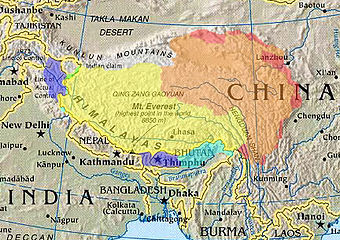
The institute of Human Rights of the University of Valencia has organised the ‘Congreso Internacional Tíbet, conflicto olvidado: entre la justicia universal y las autoinmolaciones’ (‘International Tibet Conference, forgotten conflict: between universal justice and self-immolations’), which will take place the 28 and 29 November in the Faculty of Social Sciences, in which the performance of the Chinese authorities in the Tibetan genocide will be analysed. The direction of the conference is held by the very director of the IDH, professor Consuelo Ramón Chornet and the secretary of the IDH, professor José Elías Esteve Moltó.
The Tibet issue became last week the first page of the Spanish press after the decision of the National High Court of issuing a warrant for the arrest of the former Chinese president Jiang Zemin and his former Prime Minister Li Peng, among other Chinese Communist party leaders, for the genocide in Tibet, as a result of the investigation and the complaint written by the professor of the University of Valencia José Elías Esteve. The professor of International Law José Elías Esteve, acting in his capacity of investigative attorney at the Tibet Support Committee (CAT), that together with the Fundación Casa del Tíbet and the sherpa of Spanish nationality Thubten Wangchen, filled a complaint in 2006 for genocide, as a result of which the National High Court has issued the orders for their arrest. The CAT, also with the legal advice of professor Esteve, last October managed the High Court to charge the former Chinese president Hu Jintao for genocide in Tibet.
The decision of the High Court had important diplomatic repercussions. The past 20 November, Chinese authorities expressed their “strong discomfort” for the decision of the Spanish Justice to issue the international arrest warrant. “We hope that the relevant parties in Spain take seriously China’s concerns, and that they will not do anything to harm this country or the relationship between China and Spain”, the spokesman of the Chinese Ministry for Foreign Affairs said.
For its part, the Spanish Embassy in India has denied, so far, the visa to the monk Palden Gyatso to participate in the conference, who lives in exile in India and is a witness in the trial before the National High Court.
The inaugural conference (Thursday 18:00) will be given by Professor Antonio Remiro Brotons, Professor of International Law at the Universidad Autónoma de Madrid. Together with the strictly academic sessions, on Friday (11:00 to 13:00) there will be a round table entitled “Tíbet en la encrucijada: Naciones Unidas, Derechos Humanos y víctimas” (“Tibet at the crossroads: United Nations, Human Rights and victims”), in which the documentary “Autoinmolaciones: The Burning Question” (Self-immolations: The Burning Question”) will be projected and in which Alán Cantos, president of CAT (complainant entity at the National High Court); Kate Saunders, researcher ICT and author of the expert report in the case; Thubten Wangchen, member of the Tibetan Parliament in exile and president of the Fundación Casa del Tíbet (private prosecutor of the case) will participate; and, if finally the Spanish authorities allow it, the monk Palden Gyatso, victim of the Tibetan genocide and witness before the National High Court will also participate.
The sessions will be presented and moderated by professor José Elías Esteve and by the Professor in Legal Philosophy, Javier de Lucas, who has recently published an analysis on the Spanish interests and human rights in Tibet: http://alrevesyalderecho.infolibre.es/?p=2123
The complete programme of the conference can be consulted in http://idh.uv.es/
Last update: 26 de november de 2013 14:15.
News release


















